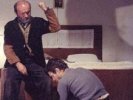Eye For Film >> Movies >> Padre Padrone (1977) Film Review
Padre Padrone was the first film ever to win both the Palme d'Or and the Fipresci International Critics Prize at Cannes, and earned its writer/directors Paolo and Vittorio Taviani the sort of recognition that had long eluded them outside of their native Italy, so that now they have entered the pantheon of great fraternal filmmakers alongside the brothers Coen, Quay, Polish and, er, Weinstein. Not bad for a low-budget film originally made for television, but then, Padre Padrone is all about miraculous achievements emerging from the humblest of origins.
Young Gavino (Fabrizio Forte) is just settling into his first year of primary school in a small town in Sardinia, when his tyrannical father Efisio (Omero Antonutti) removes him from the classroom to help look after the sheepfold in the mountains. The following years are a catalogue of beatings, hardship and loneliness, where the only thing more frightening than the poisonous snakes, rapacious bandits and murderous vendettas is Efisio's upraised fist. Gavino's sole pleasures are adolescent, livestock-assisted masturbation and accordion playing, although Efisio frowns upon the latter as an unwelcome sign of his son's independence.

After several financial setbacks, Efisio signs up the illiterate 18-year-old Gavino (Saverio Marconi) as a volunteer with the Italian army on the mainland to become a radio engineer and win respect for the family. Away from his father's domineering influence and helped by his educated comrade Cesare (Nanni Moretti), Gavino discovers an aptitude for learning and decides to turn his back on Efisio's plans for him. He must first, however, return to Sardinia and confront his father...
The Tavianis' screenplay is adapted from Gavino Ledda's autobiographical memoirs, The One That Got Away, and the author himself appears at the film's beginning, formally introduced by a voice-over and shown symbolically handing to the actor Antonutti the whittled stick which is the symbol of Efisio's savage authority. These literary origins are important, for while the film may unfold in the rocky backwoods of Sardinia, where intellectual endeavour and individual development are stamped out from an early age, Ledda's creative memory transforms this most unpromisingly barren of settings, with all its parochial specificities, into a staging ground for themes of a more universal nature: Oedipal conflict, coming-of-age drama, the prison house of patriarchy, the portrait of an artist as a young man.
The boy Gavino is repressed, reserved and inarticulate to the point of muteness. When, as a late teen, he returns to his father's house from mainland military service, he becomes so ill that he struggles to say a word ("I can hardly speak, because I have even lost my voice", he rasps). Yet if the family home and sheepfold are places where free expression is strictly forbidden, in Ledda's (and the Tavianis') imagination, everyone has a voice.
In creative voice-over, or subtitles, otherwise silent characters (Gavino's fellow pupils, his mother and siblings, his fellow shepherds - and even a disgruntled sheep!) at last get to have their say. If the Sardinian landscape seems mythic, idyllic and elegiac at times, this is only because Ledda's emerging artistry makes it so, in much the same way that, when at Cesare's urging, Gavino first opens up and begins to recount his own story, he introduces it with hexameter verses cited from Italy's greatest epic hero (and its earliest self-chronicler), Virgil's Aeneas. For Ledda, the journey to becoming a somebody is all about finding the words and investing raw experience with a poet's sensibilities.
Of course, Padre Padrone is also, as its title suggests, the story of a father and of the mode of character and conduct that he embodies, transmitted from generation to generation until finally its protagonist manages to break free of the whole vicious circle. Gavino may, as young men so often do with their fathers, in the end repudiate Efisio and all that he stands for, but the film itself makes Efisio a tragic figure who arouses pity as much as fear. He, like Gavino, is trapped in his own legacy and, amidst his violence and rage, is occasionally allowed to show unguarded moments of tenderness towards his son, moments that reveal the human so well concealed beneath the bestialised skin. Efisio may confine Gavino to illiteracy, but what the boy learns from his father about the sounds and smells of the world around him is just as much a part of his being as any formal education that he will more belatedly receive.
Padre Padrone is a film of careful balances, setting raw nature against refined culture, offering family drama that grips from start to finish without once resorting to sentimentality. Most of all, it is a blow-by-blow account of an artist's rites of passage and the growth of an individual voice - in both literature and cinema.
Reviewed on: 24 Jul 2007


















